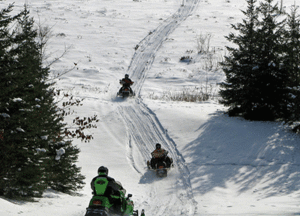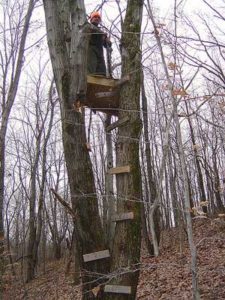Your Liability
What if someone gets hurt on my land
Landowners want to know: “Am I liable for damages if someone gets hurt on my property?” You may not be surprised to learn that it depends. Wisconsin state statute was written to cover some – but not all – personal liability for injury or death of a recreationist on your property.

State legislators recognized that with most of Wisconsin’s lands in private ownership and a citizenry that loves to get outside, landowners deserved protection should an accident occur – especially since they’re encouraged to open their lands to public recreation.
In 1963, Wisconsin’s Recreational Use Statute, Sec. 895.52, eliminated the liability of landowners when they open their property to public recreation. For example, say that a recreational snowmobile trail crosses your land. In the unfortunate event of a snowmobiler’s injury or death, the statute generally grants the landowner immunity from liability.
However…
Situations affecting your liability
The exceptions to this statute – and there are some very important ones – should convince you to talk with your insurance agent to assess your entire exposure to liability. Exceptions fit into four categories:
- Recreationist’s legal status
- Activity type
- Your negligence
- Amount of financial compensation
Recreationist’s legal status
Recreationists by law are either trespassers, licensees, or invitees. Generally, you have no responsibility for trespassers other than in cases where your actions are proven malicious or negligent (see more under “Your negligence” below).
Licensees are defined as recreationists who legally use your property for their personal gain (e.g., a snowmobiler on a recreational trail). In other words, this type of recreationist was not personally invited by you, but he or she does have permission to be on your property.
Normally, civil liability law in Wisconsin states that landowners are expected to use reasonable care to protect all users of their property. However, this is precisely why Wisconsin legislators wrote the Recreational Use Statute. Under it, landowners are not legally obliged to:
- Keep their property safe for recreational activity
- Inspect their property
- Give warning of an unsafe condition or activity on their property
The law also limits a property owner’s liability should a recreationist be injured by another recreational user on the property or by a wild animal.

But before heaving any sighs of relief, read on.
Invitees are defined as users benefiting the landowner, such as social guests invited to an event or day-use activity. Invitees also include paying customers (see “Amount of compensation” below).
Your invitees should assume safe property conditions, which increases your responsibility for their safety. Thus, a property owner may be liable for an injury to a social guest, but only if the injury occurs on platted land (technically, sub-divided land), residential land (land with a home), or within 300 feet of a commercial or manufacturing building.
Activity type
The statute grants the landowner immunity from liability for a person’s injury or death for nearly all recreational activities: cutting firewood, hunting, rock climbing, outdoor sports, snowmobiling, among many, many others.
The lone exception is organized sports teams. If you host an organized sports tournament, you are liable for the event.
Your negligence
In general, the Recreational Use Statute protects you from liability in cases where a licensee (i.e., someone with blanket permission to be on your land) incurred an injury or died on your property or caused the injury or death of someone else.
However, if your own negligence, malicious or not, causes the licensee’s injury or death, you could be held liable.
Likewise, if you have created an attractive nuisance that causes the injury or death of a child (e.g., an abandoned refrigerator makes a great hide-and-seek spot), you are not granted immunity through the statute and would be exposed to liability.
Finally, if an “act of God” (e.g., a tree falling over in a storm causes damage to a neighbor’s property) can be proven predictable (e.g., the tree trunk is rotten), you could be deemed negligent and held liable for damages.
Amount of compensation
If you, as a landowner, receive more than $2,000 of annual income in the form of payment from invitees who use your property, the statute says you are not immune from liability should an invitee get hurt or die on your land. However, payments of wild game or other products amounting to less than $5/day do not apply toward the $2,000 limit.
Get advice from a professional
In summary, although the state provides landowners with immunity from liability in certain situations, exposure to liability remains for many scenarios, particularly those in which the landowner assumes greater responsibility (knowingly or unknowingly), or receives personal gain or financial compensation.
This is why it’s important to sit down with your insurance agent and review your current policies and policy options to minimize your exposure to liability as a rural landowner.
